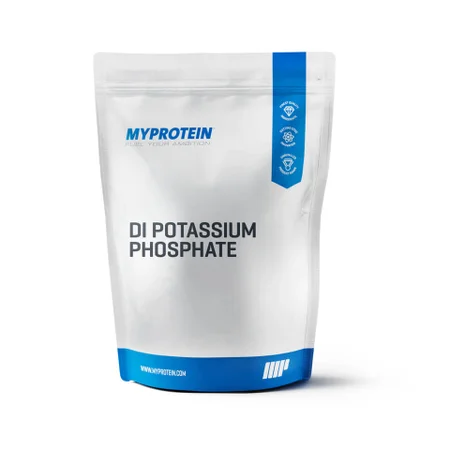
Dipotassium Phosphate is the perfect supplement for anyone looking to improve stamina and endurance, but what is it and how can it help? Our expert advisor is here to guide you.
- What is dipotassium phosphate?
- What is dipotassium phosphate used for?
- Benefits of dipotassium phosphate
- How to take dipotassium phosphate
- Dipotassium phosphate side effects
What is dipotassium phosphate?
If dipotassium phosphate (DKP) is new to you, there is still a good chance that you might have been making it a part of your diet without realizing – that is, if you haven’t been paying close attention to the list of ingredients on the back of foods in your shopping basket.
Dipotassium phosphate is a water-soluble salt that you may have purchased in the commercial form of a food additive, a fertilizer, and also a buffering agent in manufactured foods. On its own, it looks like a colorless, white substance, which, for the health and fitness minded people out there, is notably an awesome source of potassium and phosphorus. It plays a mega role in your body’s production of ATP (adenosine triphosphate), which is a high-energy molecule that your body requires for energy.
The name is just about self-explanatory – though we might also note that it goes under the title of dibasic potassium phosphate, potassium phosphate dibasic, dipotassium hydrogen orthophosphate and dipotassium hydrogen phosphate. The ‘phosphate’ half of its name is phosphate, the charged particle that contains the mineral phosphorus. Phosphorus is highly important in your body for supporting the maintenance, repair and rebuilding of healthy teeth and bones. In the context of muscular performance, phosphate is essential in their normal function and how effectively they contract.

What is dipotassium phosphate used for?
In health supplements, dipotassium phosphate is used for its health benefits, which we’ll get to shortly, as a nutrient supplement and also as a protein stabilizer in weight training drinks and powder mixes. Dipotassium phosphate is commonly used as an emulsifier, stabilizer and texturizer.
In the food industry, it is utilized as an effective a buffering agent and chelating agent, which may also be used for yeast food, emulsifying salt, and a synergistic agent of antioxidation.
You will also find dipotassium phosphate, or one of its many aliases, on health supplements and shop packaging due to its use as a food additive. In food, it is used to lower the acid levels in processed goods, and also lowers the sodium levels in low-sodium cheeses. It is also used as a stabilizer in non-dairy creamers to prevent coagulation.
Benefits of taking dipotassium phosphate
The foremost benefit of dipotassium phosphate is the fact it is a quick and convenient source of potassium. Potassium, of course, is incredibly important for your health and sporting performance. Potassium is one of the seven essential macro minerals, of which your body requires at least 100 milligrams on a daily basis in order to sufficiently support its key processes.
A healthy intake of potassium decreases your risk of stroke, lowers your blood pressure, protects you against the loss of muscle mass, preserves your bone mineral density, and reduces the risk of kidney stones. Along with the aforementioned contribution to normal muscle function, weightlifters, bodybuilders and fitness-minded folk can benefit from dipotassium phosphate as an energy supplement. This tends to apply, in particular, to anyone engaged in a training session that is a minimum of 30 minutes long without rests. This means team sports, long-distance running and circuits, high-intensity interval training and endurance orientated weight lifting workouts.
Dipotassium phosphate supplementation is beneficial in supporting the recovery of your muscles. As a result, improving your endurance capabilities it essentially means that you will be able to recover faster between burst of energy usage and have the faculty to engage in more lifts when bodybuilding.
Of equal importance is its ability to assist in the process of transporting oxygen around your body – namely, in the context of working out, to your muscles. This is particularly effective for high intensity and strenuous exercises such as heavy lifting and sprints.
How to take dipotassium phosphate
Dipotassium phosphate, as a supplement, is best consumed on an empty stomach. We recommend using accurate scales or measures to ensure even dosages, adding 1 gram to fruit juice, whey or water and taken four times a day.

Side effects of dipotassium phosphate
Dipotassium phosphate is declared “generally recognized as safe (GRAS)” by the U.S. Food and Drug Administration (FDA). There is material available, however, that may raise an eyebrow to suggest that is use may be considered with an element of caution for people with pre-existing health conditions. Conditions of concern include kidney disease, severe heart and lung disease, thyroid problems, liver disease and Addison's disease.
Though dipotassium phosphate is regarded as a safe supplement, there are some known side effects, which are mostly associated with prolonged use. This is because using the supplement over a longer period can cause an imbalance to the phosphates in your body, resulting in the following side effects:
- Headaches
- Constipation
- Arterial stiffening
- Confusion
- Hyperphosphatemia
- Nausea
- Dizziness
- Vomiting
- Diarrhoea
- Phosphorus overload

Alice Pearson is a UKVRN Registered Associate Nutritionist and UK Anti‐Doping accredited advisor, having obtained a Bachelor’s of Science in Nutrition and a Master’s of Science in Sport Nutrition. She has a specialist interest in the use of sports supplements for improving health, fitness, and sport performance. Alice has experience working with both amateur and elite athletes, including providing nutritional support to Tranmere Rovers FC and Newcastle Falcons Rugby Club. Her nutritional guidance is always supported by evidence‐based research, which she keeps up to date through continuing professional development and independent learning. In her spare time, Alice loves travelling, hitting the gym, and getting stuck into a good book. Find out more about Alice's story here.









